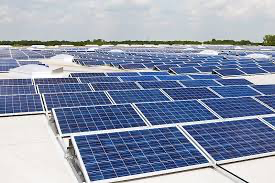The federal government has revealed its plan to halt the importation of solar panels as part of efforts to promote local manufacturing and accelerate Nigeria’s transition to renewable energy.
The Minister of Science and Technology, Uche Nnaji, made this known during the unveiling of NEV T6 electric buses in Abuja. According to him, the move aligns with Presidential Executive Order No. 5, which prioritizes indigenous technology, science, and engineering.
He emphasized that Nigeria has the capacity to meet its solar energy needs domestically, highlighting the role of the National Agency for Science and Engineering Infrastructure (NASENI) in solar panel production. Nnaji also predicted that as local production grows, more Nigerian homes and institutions will adopt off-grid power solutions.
Maximizing Local Resources for Renewable Energy
The minister pointed out that Nigeria possesses an abundance of lithium, a critical component in battery production. He assured that efforts are underway to process lithium locally for use in battery-powered systems, including electric vehicles.
Addressing concerns about power supply, Nnaji asserted that Nigeria already has power but needs to focus on cleaner energy sources. He mentioned ongoing projects to install mini-grids across the country, ensuring that hospitals and institutions benefit from solar-powered electricity.
“Our focus is not on diesel or PMS; we are working on non-carbon emission infrastructure,” he stated. “With NASENI already producing solar panels and private investors involved, it is only a matter of time before most homes in Nigeria transition off-grid. Personally, I have been off-grid for over three years, and it works perfectly.”
Government Initiatives to Support Renewable Energy
In addition to boosting local solar production, the government is introducing financial support for renewable energy adoption. The Ministry of Finance Incorporated, the Nigerian Consumer Credit Corporation (CREDICORP), and the Presidential Initiative on Compressed Natural Gas Ltd have signed a Memorandum of Understanding to launch the Credit Access for Light and Mobility Fund.
This initiative aims to provide affordable credit for solar energy installations and vehicle conversions to compressed natural gas. PI-CNG’s Chief Executive Officer, Michael Oluwagbemi, described the fund as an inclusive opportunity for Nigerians looking to switch to cleaner energy solutions.
Access Bank’s Solar Energy Financing Plan
To further encourage the adoption of renewable energy, Access Bank Plc has introduced a financing scheme for solar energy solutions in Nigeria’s healthcare sector. The “Solar for Health” project is designed to help hospitals, laboratories, and other medical facilities transition from costly fossil fuel dependency to sustainable solar power.
Speaking at the initiative’s launch event in Lagos, Gregory Jobome, Access Bank’s Executive Director and Chief Risk Officer, reaffirmed the bank’s commitment to supporting energy-efficient solutions that will improve access to reliable power across the country.
With these combined efforts from the government and private sector, Nigeria is on a path to achieving greater energy independence through locally produced solar solutions.








Leave a Reply